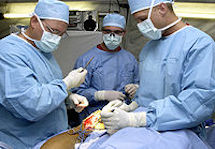In New York, he writes, “The purpose of these report cards was to improve cardiac surgery by tracking surgical outcomes, sharing the results with hospitals and the public, and when necessary, placing surgeons or surgical programs on probation. The idea was that surgeons who did not measure up to their colleagues would be forced to improve.
“But the report cards backfired. They often penalized surgeons, like the senior surgeon at my hospital, who were aggressive about treating very sick patients and thus incurred higher mortality rates. When the statistics were publicized, some talented surgeons with higher-than-expected mortality statistics lost their operating privileges, while others, whose risk aversion had earned them lower-than-predicted rates, used the report cards to promote their services in advertisements.”




